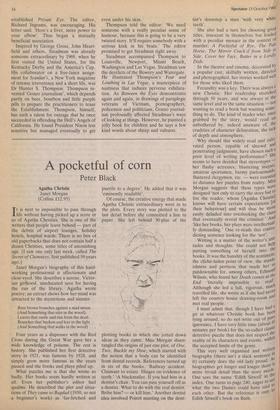A pocketful of corn
Peter Black
Agatha Christie Janet Morgan (Collins £12.95)
It is next to impossible to pass through life without having picked up a score or so of Agatha Christies. She is one of the writers that people leave behind — part of the debris of airport lounges, holiday hotels, hospital wards. There is no box of old paperbacks that does not contain half a dozen Christies, some titles of astonishing age. (I saw one only last week, called The Secret of Chimneys, first published 59 years ago.)
Janet Morgan's biography of this hard- working professional is affectionate and clear-eyed. She describes a serene, Victor- ian girlhood, uneducated save for having the run of the library. Agatha wrote poetry; an extract shows how her mind was attracted to the mysterious and sinister.
Bare brown branches against a mad moon (And Something that stirs in the wood), Leaves that rustle and rise from the dead, Branches that beckon and leer in the light (And Something that walks in the wood) . . .
Four years as a dispenser with the Red Cross during the Great War gave her a wide knowledge of poisons. The rest is history. She published her first detective story in 1921, was famous by 1928, and simply grew more famous as the years passed and the books and plays piled up.
What puzzles me is that she wrote so badly. Her books seem hardly written at all. Even her publisher's editor had qualms. He described the plot and situa- tions of They came to Bagdad (1950, so not a beginner's work) as 'far-fetched and puerile to a degree'. He added that it was 'eminently readable'.
Of course, the creative energy that made Agatha Christie extraordinary went in to the plots. Every story was plotted to the last detail before she committed a line to paper. She left behind 30-plus of the plotting books in which she jotted down ideas as they came. Miss Morgan disen- tangled the origins of just one plot, of One, Two, Buckle my Shoe, which started with the notion that a body can be identified from dental records. References turned up in six of the books. 'Railway accident. Claimant to estate. Hinges on evidence of teeth.' A blackmailer. If you had him in a dentist's chair. You can pass yourself off as a dentist. What to do with the real dentist. Bribe him? — or kill him.' Another dentist idea involved Poirot meeting on the dent- tist's doorstep a man 'with very white teeth'.
She also had a turn for choosing good titles, innocent in themselves but loaded
with a peculiar menace in the context of murder: A Pocketful of Rye, The pale Horse, The Mirror Crack'd from Side to Side, .Cover her Face, Butter in a Lordly Dish. In the theatre and cinema, decorated by a popular cast, skilfully written, directed and photographed, her stories worked well for those who liked them.
Fecundity was a key. There was always a new Christie. Her readership stretched through 50 years, and was always at the same level and in the same situation — wanting to read a book but wanting some thing to do. The kind of reader who, once grabbed by the story, would read on unbothered by, indeed unaware of, the crudities of character delineation, the lac" of depth and atmosphere. Why should this widely read and culti- vated person, capable of shrewd and penetrating judgments, have chosen such a poor level of writing performance? She seems to have decided that stereotypes -- her flashy actresses, blustering majors, amateur sportsmen, barmy parlourmaidst flustered clergymen, etc. — were essential to distance her puzzles from reality. Miss Morgan suggests that these types were designed 'not only to carry the story but to fox the reader, whom [Agatha Christie) knows will have certain expectations [of their behaviour] and will thus be more easily deluded into overlooking the clues that eventually reveal the criminal.' And 'like her books, her plays were intellectual- ly demanding.' One re-reads this contra' dieting sentence looking for the 'not'. . Writing is a matter of the writer's atti- tudes and thoughts. She could not helP putting something of herself into the books. It was the banality of the sentiment! the cliché-laden point of view, the mawk" ishness and pertness that made her putdownable for, among others, Edmun° Wilson, who found her Death comes as the End 'literally impossible to read'," Although she led a full, vigorous, intic", travelled life, she wrote as if she had nevecl left the country house drawing-room an met real people. I must admit that, though I have had a go at whatever Christie book has been lying around, so do not write out of ignorance, I have very little time (about " minutes per book) for the so-called classic detective puzzle that does not respect the reality of its characters and events, within the accepted limits of the genre. This very well organised and written biography (there isn't a slack sentence in it) certainly does the old lady proud. A,S biographies get longer and longer there more trivial detail than the story fleet One sees the name 'Edith Sitwell' in til." index. One turns to page 240, eager to see what the two Dames could have said t°0 each other. But the reference is onlY t Edith Sitwell's book on Bath.






















































 Previous page
Previous page